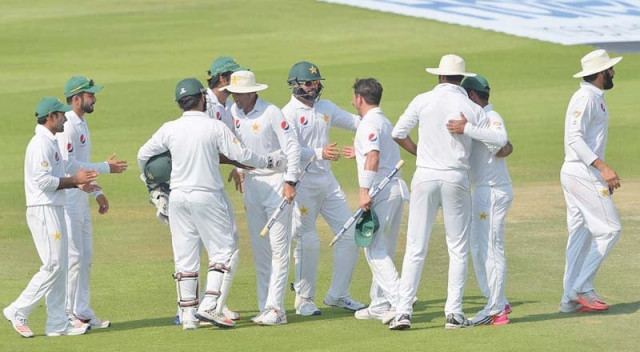History backs Pakistan on New Zealand tour
Green Caps and England are only two sides to have not lost a Test series against Kiwis on their soil since 1984-85

Pakistan and England are the only teams to have not lost a Test series in New Zealand since the 1984-85 season. PHOTO: AFP
Pakistan and England are the only teams to have not lost a Test series there since the 1984-85 season — South Africa are undefeated in New Zealand since their readmission to Test cricket some 25 years ago.
Pakistan batsmen and bowlers have made hay in the New Zealand conditions in recent decades and have mastered the pitches which offer seam and swing to the bowlers.
Mickey Arthur clears the air about Babar Azam’s short-ball problems
Contrary to popular belief Pakistan batsmen have acquainted themselves very well with the conditions other than the odd blemish.
Javed Miandad leads the list of Pakistan run-getters in New Zealand with a tally of 928 runs at a magnificent average of 77.33, embellished with three centuries including a double century in the 1988-89 series at Auckland.
Younus Khan, Mohammad Yousuf, Inzamamul Haq and Saeed Anwar, the batting greats of the last two decades, all average more than 50, with Younus averaging 65.28 in his five Test appearances in the Black Caps’ backyard.
 The stranglehold though emanates primarily from the potent bowling attacks that Pakistan have had the luxury of fielding in New Zealand. The early and mid-nineties were dominated by the legendary pair of Wasim Akram and Waqar Younus, who were ably supported by Mushtaq Ahmed and Saqlain Mushtaq and emerged as a major Test force in the late 90s.
The stranglehold though emanates primarily from the potent bowling attacks that Pakistan have had the luxury of fielding in New Zealand. The early and mid-nineties were dominated by the legendary pair of Wasim Akram and Waqar Younus, who were ably supported by Mushtaq Ahmed and Saqlain Mushtaq and emerged as a major Test force in the late 90s.Shoaib Akhtar then took over the mantle after the W’s (Wasim and Waqar) hung their boots; even Mohammad Sami owned Auckland once — the Karachi born’s debut Test in the March 2001 series — both Shoaib and Sami won a Test each in New Zealand during the noughties.
Pakistan in the land Down Under
Wasim heads the bowlers list with 50 scalps in only seven appearances in New Zealand, the left-armer was a constant thorn in the Black Caps’ flesh ever since his Test debut there in the 1984-85 series and played a leading role in the 1994 series win besides the one-off Test wins in Hamilton (1992) and Christchurch (1995).
Misbahul Haq has already tasted success as captain in New Zealand, leading the team to a 1-0 win over the hosts in an absorbing two-match Test series played in January 2011.
An inspired fifth day bowling performance sent the hosts packing for 110 in their second innings of the Hamilton Test with Wahab Riaz, Tanvir Ahmed and Abdur Rehman running riot with three wickets each.
Misbah, Younus and Asad Shafiq batted out the last day of the Wellington Test to ensure a series win — Pakistan’s third series win since the 1985 defeat, the tourists also won both one-off Test matches in 1993 and 1995 while the two teams drew the 1989, 2001 and 2009 three match series.
Fresh from a three-match whitewash defeat at the hands of India, New Zealand have all to do if they are to overturn their poor run against Pakistan at home.
Kane Willamson who has replaced the hugely inspiring Brendon McCullum as captain, has huge boots to fill and his start as a full-time Test leader was anything but ideal on the spinning Indian tracks.
For Pakistan, record-breaking leg-spinner Yasir Shah would hold the key with the ball together with the seam, swing and pace of Mohammad Amir and Wahab Riaz.
If the pitches offer lateral movement then Pakistan have Sohail Khan to exploit the opportunity with his probing line and length, once again there is a series for the taking in New Zealand, and Misbah’s men must make it count.
Published in The Express Tribune, November 7th, 2016.
Like Sports on Facebook, follow @ETribuneSports on Twitter to stay informed and join in the conversation.



















COMMENTS
Comments are moderated and generally will be posted if they are on-topic and not abusive.
For more information, please see our Comments FAQ